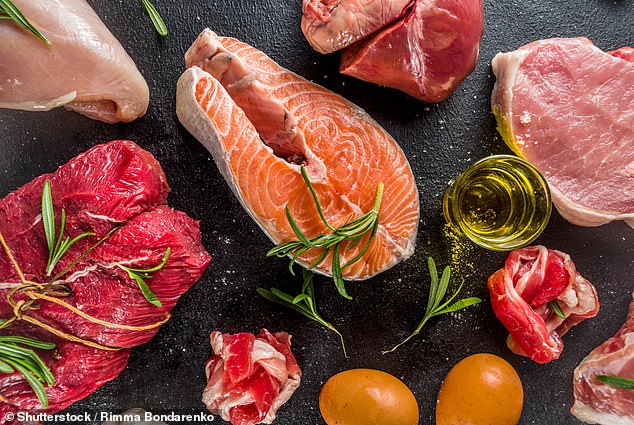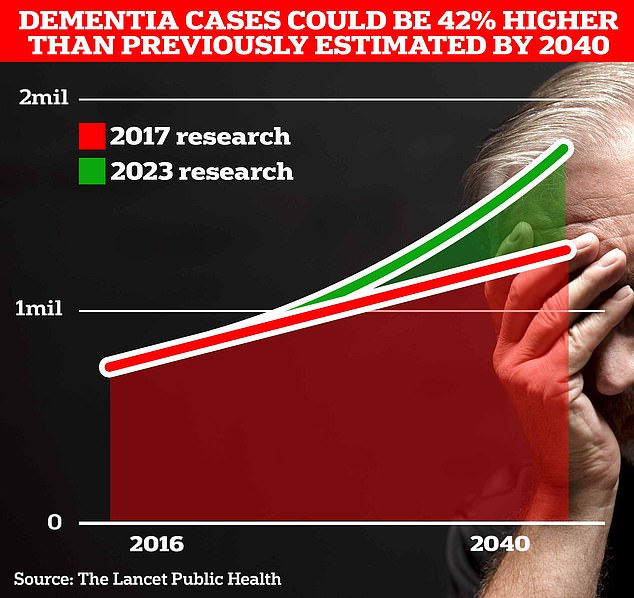Top dietitian identifies the most popular foods that may increase the risk of dementia
People who choose to eat a carnivore diet are ‘playing with fire’ a top doctor has warned.
Social media sites such as TikTok are full of reports spoofing the diet plan, which sees followers subsisting on animal-based foods such as steak, eggs and butter, claiming weight loss benefits.
But NHS consultant Dr Rupy Aujla says those who choose to live a meat-eating lifestyle can put themselves at serious health risks, including memory problems.
He said: ‘That is something that would worry me, that people are putting themselves at risk of heart disease and dementia.
Speaking on his podcast, The Doctor’s Kitchen, Dr Aujla said there are many risks people think they should be aware of.

NHS consultant Dr Rupy Aujla says those who choose to live a carnivorous lifestyle can put themselves at serious health risks, including dementia.

The NHS says meat is a good source of the protein the body needs to maintain and build muscle, and can also provide a good source of vitamins and minerals such as iron, zinc and B vitamins.
‘I just think this is playing with fire considering we don’t have long-term studies of people eating these foods in modern environments,’ he said.
‘You put yourself at greater risk of heart disease and dementia, and everything that comes with it.’
He said the benefits of a meat diet are mainly related to the lack of carbohydrates, such as pasta and bread, which can help some people lose weight in certain situations.
‘As a short-term diet it may offer therapeutic benefits to people in special situations such as those with true tolerance,’ he said.
However, citing human and mouse studies, Dr Aujla said scientists have found that a carnivore diet can have negative health effects.
In a mouse study he said: ‘It found that long-term adherence to a keto or carnivore diet may contribute to inflammation and aging.
‘In fact they saw changes in vital organs such as the heart and kidneys where the accumulation of something called senescent cells contributes to systemic inflammation and toxicity.’
‘Senescent cells are similar to age cells that like to circulate and cause severe inflammation and are not cleared by the immune system.

Brian Johnson, better known as the King of Courage, has built a following from his raw meat dishes, especially those filled with meat.

Early symptoms of hepatic encephalopathy include confusion, forgetfulness, changes in personality or mood, changes in sleep patterns and difficulty writing – all signs of dementia.
‘These are the type of cells you don’t want more of and can contribute to systemic inflammation in general.’
In human studies, Dr Aujla highlighted, the increased risk of heart muscle dysfunction and the effect on the health of cells that can increase chronic inflammation.
But he added that the most worrying aspect of animal food is high levels of cholesterol, which is linked to an increased risk of heart attack and stroke as well as ‘dementia’.
The NHS says meat is a good source of the protein the body needs to maintain and build muscle, and can also provide a good source of vitamins and minerals such as iron, zinc and B vitamins.
However, it advises Brits to choose to cut down on fat and reduce consumption of red and processed meat to maximize the health benefits while minimizing the negatives such as saturated fat which can increase risk. of high cholesterol.
The NHS highlights eggs and fatty fish containing omega-3 fatty acids as healthy animal proteins.
Health service advice says Brits who eat 90g of red or cooked meat a day should try to reduce it to 70g.
For the context of 70g it would be three slices of ham or a quarter of a pound of beef.
The NHS recommends this because eating more processed meat and red meat has been linked to an increased risk of colon cancer.
It comes a few weeks after a review of 2million people who received theeating red and processed meat can lead to a higher risk of developing type 2 diabetes.
The study revealed that eating 50 grams of processed meat a day – the equivalent of two slices of ham – was associated with a 15% greater risk of developing type 2 diabetes over 10 years. coming.
Meanwhile, eating 100g of unprocessed red meat a day – the equivalent of a small steak – was associated with a 10% higher risk of type 2 diabetes.
Eating 100g of chicken a day – such as a small chicken breast – was also linked to an 8 per cent higher risk of the condition.
#Top #dietitian #identifies #popular #foods #increase #risk #dementia
